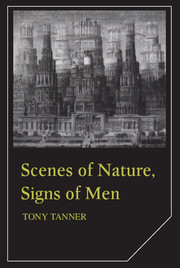Book contents
- Frontmatter
- Contents
- Preface
- 1 Scenes of nature, signs of men
- 2 Notes for a comparison between American and European Romanticism
- 3 Problems and roles of the American artist as portrayed by the American novelist
- 4 James on Hawthorne
- 5 The lost America – the despair of Henry Adams and Mark Twain
- 6 Henry James and Henry Adams
- 7 William Dean Howells and A Hazard of New Fortunes
- 8 Stephen Crane
- 9 The Bostonians and the human voice
- 10 Games American writers play: ceremony, complicity, contestation, and carnival
- 11 Toward an ultimate topography: the work of Joseph McElroy
- 12 Frames and sentences
- 13 William Gass's barns and bees
- Index
9 - The Bostonians and the human voice
Published online by Cambridge University Press: 01 June 2011
- Frontmatter
- Contents
- Preface
- 1 Scenes of nature, signs of men
- 2 Notes for a comparison between American and European Romanticism
- 3 Problems and roles of the American artist as portrayed by the American novelist
- 4 James on Hawthorne
- 5 The lost America – the despair of Henry Adams and Mark Twain
- 6 Henry James and Henry Adams
- 7 William Dean Howells and A Hazard of New Fortunes
- 8 Stephen Crane
- 9 The Bostonians and the human voice
- 10 Games American writers play: ceremony, complicity, contestation, and carnival
- 11 Toward an ultimate topography: the work of Joseph McElroy
- 12 Frames and sentences
- 13 William Gass's barns and bees
- Index
Summary
A voice, a human voice, is what we want.
Olive Chancellor's cry for ‘a human voice’ comes just before Verena Tarrant is about to give her address in Miss Birdseye's apartment which will enthrall and captivate – in different ways – both Olive and her Southern cousin, Basil Ransom, and duly precipitate the action and struggles of the novel. The question of her ‘voice’ – its appropriation and development, its muffling and silencing – is central to the book, and this in turn opens up problems of rights and abilities of utterance, articulation, discourse, publication – speech and writing – in general, which are not only peculiarly pointed and relevant to the period of American history about which James was writing (the 1870s), but part – a central part – of a contestation and struggle which are endemic to our, and arguably any, society. It is a matter not only of who ‘has a voice’ – who holds the pen, who holds the floor – in society, but more searchingly of what is a voice, ‘a human voice’? It is because this is a matter of profound and permanent importance that I think James's novel about a group of Boston feminists in post-Civil-War America is as alive and urgent (and instructive) for us today as it was for his (mostly unappreciative) contemporaries.
- Type
- Chapter
- Information
- Scenes of Nature, Signs of MenEssays on 19th and 20th Century American Literature, pp. 148 - 175Publisher: Cambridge University PressPrint publication year: 1987



